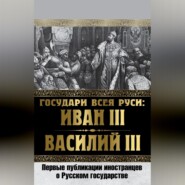По всем вопросам обращайтесь на: info@litportal.ru
(©) 2003-2024.
✖
Tales from the German, Comprising specimens from the most celebrated authors
Настройки чтения
Размер шрифта
Высота строк
Поля
"But now," said Kohlhaas, "why in the world did they send you away?"
"Because, master," replied the man, "they wanted to get rid of me; because, as long as I was there, they could not ruin the horses. In the yard, and in the servants' room, they always made queer faces at me, and because I thought 'you may twist your mouths out of joint, if you like,' they managed to find a pretext, and turned me out of the yard."
"But the reason," said Kohlhaas, "they must have had some reason."
"Oh, certainly," replied Herse, "and a very good one too. On the evening of the second day which I had passed in the sty, I took the horses, which had become dirty, and was going to ride them out to water. When I was just at the gate, and was about to turn, I heard the castellan and the bailiff, with servants, dogs, and sticks, rush upon me from the servants' room, and shout out 'Stop the thief, stop the hangdog!' as if they were all possessed. The gate-keeper intercepted my passage, and when I asked him and the uproarious mob what was the matter, the castellan, seizing the bridle of the two horses, cried, 'Matter, indeed! Where are you going with the horses?' and so saying, seized me by the collar. Why, where should I be going?' said I, 'I am going to water the horses.' 'Oh, to water!' cried the castellan, 'I'll water you! I'll teach you to swim on the high road all the way to Kohlhaasenbrück.' Upon this, he and the bailiff, who had laid hold of my leg, flung me treacherously from the horse, so that I lay full length in the mud. 'Murder!' shouted I, 'There are the harness, and the horse-cloths, and a bundle of linen belonging to me in the stable.' But the castellan and the servants, while the bailiff led off the horses, belaboured me with whips, and cudgels, and kicks, till I fell down, half dead, at the gate. And when I said, 'Where are the thievish rogues taking the horses?' and got up, 'Out of the castle-yard!' cried the castellan. 'Ho, there, Cæsar! – Ho, Touzer! – Ho, Pincher!' and straight more than a dozen dogs flew at me. At this I broke a stick or something from the fence, and lay three of the dogs dead at my feet; but when, tortured by their fangs, I was forced to give way, 'Phew!' went a pipe – the dogs were in the yard – bang went the gate – the bolt was drawn, and down in the road I fell, quite exhausted."
Kohlhaas, though his face was white, affected a jocose style, and said, "Now, did not you wish to abscond, Herse?" and when the man, colouring, looked on the ground, he added, "Now confess, you did not like the pigsty, you thought the stable in Kohlhaasenbrück much better – did you not?" "Thunder of Heaven!" exclaimed Herse, "I left the harness and horse-cloths, and the bundle of linen in the sty. Should I not have secured the three crowns which I left in the red silk neckerchief, hid behind the manger? Death and the devil! – When you talk so, you make me wish to light that match again which I threw away;" "Nay, nay," said Kohlhaas, "I did not mean so ill with you, I believe every word you have spoken, and if there is any talk about it, I will take the sacrament upon it; I am only sorry that you fared no better in my service. Go to bed, Herse; go to bed. Take a flask of wine and comfort yourself – you shall have justice." He then rose, asked for a list of the things which the man had left in the sty, specified their value; asked him the expenses of curing his hurt, and, after shaking hands with him, let him go.
He then told his wife, Lisbeth, the whole particulars of the affair; said that he was resolved to claim public justice, and was pleased to see that in this design she fully agreed with him. For she said that many other travellers, probably less forbearing than he, would go by that castle, that it would be a pious work to stop disorders like these, and that she would soon collect enough for the expenses of the suit. Kohlhaas called her a dear woman, passed this and the following day with her and his children, and, as soon as business allowed, went to Dresden to make his complaint before the tribunal.
Then with the help of a lawyer of his acquaintance he drew up a petition, in which, after a circumstantial statement of the wrong which the Squire Wenzel von Tronka had done both to him, and his servant Herse, he claimed that he should be punished according to law, that his horses should be restored to their former condition, and that compensation should be awarded for the wrong which he and his servant had suffered. The case was clear enough, the fact that the horses had been illegally detained threw a light on all the rest, and even if it were assumed that they had been injured merely by chance, the claim of their owner to have them back in a healthy condition, was nevertheless just. Besides Kohlhaas had plenty of good friends at Dresden, who promised heartily to support his cause, his extensive trade in horses had gained him a numerous acquaintance, and the honesty of his dealings had acquired him the good will of the most important men in the country. He frequently dined with his advocate, who was himself a man of consequence, gave him a sum to defray the law expenses, and being fully satisfied by him as to the issue of the suit, returned, after a few weeks to his wife at Kohlhaasenbrück. However months passed on, and the year was nearly at an end, and he had not yet got from Saxony even a statement concerning his suit, much less the decision itself. After he had applied to the tribunal several times anew he asked his legal assistant in a confidential letter, what could be the cause of this monstrous delay, and learned that his suit had been entirely set aside in consequence of a high application to the supreme court at Dresden. In answer to another letter from the horse-dealer, couched in terms of high dissatisfaction, and asking a reason for all this, the jurist replied, that the Squire Wenzel von Tronka was related to two young gentlemen, Herrn Henry and Conrad von Tronka, one of whom was attached to the lord cup-bearer, while the other was chamberlain. He advised him, without proceeding further in the suit, to try to get his horses back from the Tronkenburg, gave him to understand that the squire, who was now in the capital, had ordered his people to return them, and finally entreated him, if he would not be satisfied, at any-rate not to give him (the writer) any further commissions relative to the matter.
At this time, Kohlhaas happened to be in Brandenburg, where the town-governor (Stadt-hauptmann) Heinrich von Geusau, to whose jurisdiction Kohlhaasenbrück belonged, was occupied in founding several charitable institutions for the poor and sick, a considerable sum, which had come into the possession of the city, being appropriated for that purpose. Above all he was endeavouring to convert a mineral spring, the source of which was in a neighbouring village, and concerning the virtues of which higher expectations were raised than were fulfilled by the parties, to the use of invalids, and as Kohlhaas, in consequence of many transactions he had had with him, during his sojourn at the court, was well known to him, he allowed the servant Herse, who had not been able to breathe without a pain in the chest since the unlucky day at Tronkenburg, to try the little spring, which was now enclosed and roofed over. Now it chanced that the governor was standing by the bath, in which Herse was laid by Kohlhaas, to make certain arrangements, when the horse-dealer received by a messenger, sent by his wife, the disheartening letter from his advocate at Dresden. The governor, who while he was talking with the physician, saw Kohlhaas drop a tear on the letter he had just received and opened, went up to him in a kind manner, and asked him what misfortune had happened; and when the horse-dealer, instead of answering, put the letter in his hand, this worthy man, to whom the abominable wrong, which had been done at the Tronkenburg, and in consequence of which Herse lay ill before him, perhaps for life, was well known, slapped him on the shoulder, and bid him not to be disheartened, as he would aid him to obtain justice. In the evening, when the horse-dealer, in compliance with his instructions, called upon him at his castle, he told him that he need only draw up a petition to the Elector of Brandenburg, with a short statement of facts, attach to it the advocate's letter, and claim seignorial protection on account of the violence he had suffered in the Saxon territory. He promised to enclose the petition in a packet, which lay ready at hand, and thus to put it into the hands of the elector, who would certainly, on his own account, apply to the Elector of Saxony, as soon as circumstances permitted. Such a step was all that was wanted to obtain justice from the tribunal at Dresden, in spite of the tricks of Squire von Tronka and his adherents. Kohlhaas, highly delighted, thanked the governor most heartily, for this new proof of kindness, told him he was only sorry that he had not at once commenced proceedings at Berlin, without taking any steps at Dresden, and after he had duly prepared the petition in the secretary's office, and had handed it over to the governor, he returned to Kohlhaasenbrück better satisfied than ever as to the prospects of the affair. In a few weeks, however, he had the mortification of learning, through a judge, who was going to Potsdam, about some affairs of the governor, that the elector had handed over the petition to his chancellor, Count Kallheim, and that the latter, instead of going immediately to the court at Dresden to examine the matter and inflict punishment, as seemed to be his duty, had first applied for information to Squire von Tronka himself. The judge,[20 - "Gerichtsherr" means lord of the manor with right of judicature.] who stopped in his carriage before Kohlhaas's door, and who seemed to have been expressly commissioned to make this communication, could give no satisfactory answer to the question of his surprise: "But why did they act in this way?" he merely said, that the governor had sent word, begging him to be patient, appeared anxious to pursue his journey, and it was not till the end of a short conversation, that Kohlhaas learned by a few stray words, that Count Kallheim was related by marriage to the von Tronka's. Kohlhaas, who no longer took any delight in attending his horses, or in his house and farm – scarcely in his wife and children – waited the arrival of the following month with the gloomiest misgivings, and it was quite in accordance with his expectations, that when the interval was passed, Herse, who had been in some measure relieved by the bath, returned from Brandenburg with a letter from the governor, accompanying a paper of larger dimensions. The letter was to the effect that the writer was sorry he could do nothing for him, but that he sent him a decree of the chancery, and advised him to take away the horses, which he had left at Tronkenburg, and let the whole matter drop. According to the decree, "he was a vexatious litigant, on the information of the tribunal at Dresden; the squire with whom he had left the horses did nothing to detain them; he might send to the castle and fetch them, or at any rate let the squire know where he was to send them, and at all events he was to abstain from troubling the court with such wranglings." Kohlhaas, to whom the horses were not the chief object – had it been a couple of dogs he would have been equally mortified – literally foamed with rage when he had received this letter. Whenever there was a noise in his farm, he looked with the sickening sensation which had even stirred his heart towards the gate, expecting to see the squire's servants, with his horses starved and worn out; this was the only case in which his mind, otherwise well-trained by the world, could find nothing that exactly corresponded with his feelings. Shortly afterwards he learned by means of an acquaintance, who had travelled that way, that the horses were still used with the squire's at Tronkenburg for field labour, and in the midst of his pain at seeing the world in such a state of disorder, there arose a feeling of inner contentment as he found there was at least something like order in his own heart. He invited the proprietor[21 - "Amtmann" means here a farmer of crown-lands.] of the neighbouring lands, who had long entertained the notion of increasing his possessions by purchasing the pieces of ground adjoining, and asked him, when he had taken a seat, what he would give him for his estates in Brandenburg and Saxony, taking house and farm all in the lump, with or without fixtures. His wife Lisbeth turned pale as she heard these words. Turning round she took up the youngest child, who was sporting on the floor behind her, and darted at the horse-dealer, and a paper which he held in his hand, glances, in which doubt was depicted, and which passed across the red cheeks of the boy, who was playing with the ribbons on her neck. The farmer, who observed his confused manner, asked him what had put so strange a thought all at once into his head. Kohlhaas, with as much cheerfulness as he could assume, replied that the notion of selling his farm on the banks of the Havel was not quite new, that they had both often discussed this matter already, that his house in the suburbs of Dresden was comparatively a mere appendage, not to be considered, and finally that if he would comply with his offer and take both estates, he was quite ready to conclude the contract. He added, with a kind of forced levity, that Kohlhaasenbrück was not the world; that there might be purposes, in comparison with which that of presiding over one's household, like an orderly father, was trivial and subordinate, and that in short his mind, as he was bound to say, was set upon great matters, of which perhaps the farmer would soon hear. The farmer satisfied with this explanation, said merrily to the wife, who kissed her child again and again: "He won't want immediate payment, will he?" and then laying upon the table the hat and stick he had hitherto carried between his knees, he took the paper which Kohlhaas had in his hand to read it. Kohlhaas moving closer to him, explained that this was a conditional contract which he had drawn up, and which would become absolute in four weeks; showed that nothing was required but the signatures and the filling in of the two sums, namely, the purchase-money and the price of redemption, in case he should return within the four weeks, and again asked him in a cheerful tone to make an offer, assuring him that he would be reasonable, and would not hesitate about trifles. The wife walked up and down in the room, her heart palpitating to such a degree that her handkerchief, at which the child was pulling, seemed ready to fall from her shoulders. The farmer said that he had no means of estimating the value of the Dresden property, whereupon Kohlhaas, pushing to him the documents that had been exchanged when he had purchased it, replied that he valued it at one hundred gold crowns, although it appeared clearly enough from the documents themselves, that it cost him almost half as much again. The farmer, who read the contract over once more, and found that on his side also the liberty of retracting was specially provided, said, already half determined, that he could not make use of the stud that was in the stables; but when Kohlhaas replied that he did not wish to part with the horses, and that he also wished to keep some weapons that hung in the gun-room, he hemmed and hesitated for a while, and at last repeated an offer which, half in jest, half in earnest, he had made in the course of a walk, and which was as nothing compared to the value of the property. Kohlhaas pushed pen and ink towards him that he might write, and when the farmer, who could not trust his senses, asked the horse-dealer if he was really serious, and the horse-dealer somewhat sharply asked the farmer if he thought he could be in jest, the latter, with a somewhat scrupulous countenance, took up the pen and wrote. He struck out the part relating to the sum to be paid, in case the vendor should repent his bargain, bound himself to a loan of one hundred crowns on the security of the Dresden property, which he would on no account consent to purchase, and left Kohlhaas full liberty to recede from his contract within two months. The horse-dealer, touched by this handsome conduct, shook the farmer's hand very heartily, and after they had agreed on the chief condition, which was that a fourth of the purchase-money should be paid in cash down, and the rest at the Hamburg bank three months afterwards, he called for wine, that they might make merry over a bargain so happily concluded. He told the servant-maid, who entered with bottles, that his man Sternbald was to saddle the chesnut horse, saying that he must ride to the city, where he had business to transact, and hinting that when he returned he would speak more openly about that which he must now keep secret. Then filling the glasses he asked about the Poles and the Turks, who were then at war with each other, entangled the farmer into all sorts of political conjectures on the subject, and finally took a parting glass to the success of their bargain, and dismissed him.
No sooner had the farmer left the room, than Lisbeth fell on her knees before her husband. "If," she cried, "you still retain any feeling for me, and for the children which I bore you; if we are not already cast off – for what cause I know not – tell me what is the meaning of these frightful preparations?"
"Nothing, dearest wife, that can trouble you, as matters stand," answered Kohlhaas. "I have received a decree, in which I am told that my proceeding against Squire von Tronka is mere vexatious wrangling; and because there must be some misunderstanding in this matter, I have determined to commence my suit once more, personally, with the sovereign of the country himself."
"But why sell your house?" she exclaimed, as she rose from the ground in confusion.
The horse-dealer, gently embracing her, replied: "Because, dearest Lisbeth, I will not abide in a country in which my rights are not protected. If I am to be trampled under foot, I would rather be a dog than a man. I am certain that, on this point, my wife thinks with me."
"But how do you know," she asked, wildly, "that they will not protect you in your rights? If you approach our sovereign as modestly as you ought, with your petition, how do you know that it will be cast aside, or answered with a refusal to hear you?"
"Well then," answered Kohlhaas, "if my fear turns out to be groundless, my house, at any rate, is yet unsold. Our sovereign himself, I know, is just; and if I can succeed in approaching his person, through the people who surround him, I have no doubt I can obtain my rights, and before the week has passed, can return gladly to you and my old business back again. May I then," he added, as he kissed her, "remain with you till the end of my life! However," he continued, "it is advisable that I should be prepared for every event, and hence I wish you to leave this place for a time, if possible, and to go, with your children, to your aunt at Schwerin, whom you have been long anxious to visit?"
"How," cried the wife. "I go to Schwerin? – I cross the border with my children, to go to my aunt at Schwerin?" And her voice was stifled with horror.
"Certainly," replied Kohlhaas, "and, if possible, immediately, that I may not be impeded in the steps I am about to take in this matter."
"Oh, I understand you," she exclaimed. "You want nothing but weapons and horses; the rest any one may take who will." And so saying, she threw herself down upon a seat and wept.
Kohlhaas, much perplexed, said: "Dearest Lisbeth, what are you doing? God has blessed me with wife, children, and property; shall I wish, for the first time, that it was otherwise?" And he sat down by her in a kindly mood, while she, at these words, fell blushing on his neck. "Tell me," he said, moving the curls from her forehead, "what I am to do? Shall I give up my cause? Shall I go to Tronkenburg, and ask the knight for my horses, mount them, and then ride home to you?"
Lisbeth did not venture to answer "Yes;" she shook her head, weeping, clasped him fervently, and covered his breast with burning kisses.
"Good!" cried Kohlhaas. "Then, if you feel that I must have justice, if I am to carry on my business, grant me the liberty which is necessary to attain it." Upon this he rose up, and said to the servant, who told him that his chestnut horse was saddled, that the horses must be put in harness the following day, to take his wife to Schwerin. Suddenly Lisbeth saying that a thought had struck her, raised herself, wiped the tears from her eyes, and asked him, as he sat down at a desk, whether he could not give her the petition, and let her go to Dresden instead of him, to present it to the sovereign.
Kohlhaas, struck by this sudden turn, for more reasons than one, drew her to him, and said: "Dearest wife, that is impossible! The sovereign is surrounded by many obstacles, and to many annoyances is the person exposed who ventures to approach him."
Lisbeth replied that the approach would be a thousand times easier for a woman than for a man. "Give me the petition," she repeated; "and if you wish nothing more than to know that it is in his hands, I will vouch for it."
Kohlhaas, who had frequently known instances of her courage as well as of her prudence, asked her how she intended to set about it. Upon which she told him, hanging down her head abashed, that the castellan of the electoral castle had formerly courted her, when she served at Schwerin; that it was true he was now married, and had many children, but that she might still not be quite forgotten – in short, she asked him leave to take advantage of this and other circumstances, which it would be superfluous to name. Kohlhaas kissed her right joyously, told her that he accepted her proposition, and that nothing more was wanted than for her to stay with the castellan's wife, to secure an interview with the sovereign, gave her the petition, had the brown horses harnessed, and sent her off, safely stowed under the care of his faithful servant, Sternbald.
Of all the unsuccessful steps which he had taken in the affair this journey proved the most unlucky. For, in a few days, Sternbald returned to the farm, leading slowly along the vehicle in which Lisbeth lay stretched, with a dangerous bruise on her breast. Kohlhaas, who approached it pale and terrified, could learn nothing connected as to the cause of this calamity. The castellan, according to the servant's account, had not been at home, they had, therefore, been obliged to put up at an inn in the vicinity of the castle; this inn Lisbeth had left on the following morning, and had told the man to remain with the horses; it was not till the evening that she returned, in the condition in which she was seen. It appeared that she had pressed forward too boldly towards the sovereign, and that, without any fault on his part, she had received a blow on the breast, from the shaft of a lance, through the rude zeal of one of the guards who surrounded him. At least so said the people who, in the evening, brought her to the inn in a state of insensibility, for she herself could speak but little, being prevented by the blood that flowed from her mouth. The petition was afterwards taken from her by a knight. Sternbald said that he had wished immediately to set out on horseback and inform his master of the misfortune that had happened, but that, in spite of all the representations of the surgeon who had been called, she had insisted on being conveyed to her husband at Kohlhaasenbrück. The journey had quite exhausted her, and Kohlhaas put her in a bed, where she laid some days striving with difficulty to draw her breath. Vain were all endeavours to restore her to consciousness, that she might throw some light on the events; she lay with her eyes fixed, and already glazed, and returned no answer. Only once, just before her death did she recover her senses. For, as a minister of the Lutheran religion (to which newly springing faith she had attached herself, through the example of her husband) was standing at her bed-side, and with a loud and solemn voice was reading to her a chapter out of the bible, she looked at him suddenly, with a dark expression, took the bible out of his hand, as if there were nothing in it to be read to her, turned the leaves over and over, as if she were looking for something, and at last pointed out to Kohlhaas, who sat by the bed, the verse: "Forgive thine enemies – do good unto them that hate thee!" She then pressed his hand, with a most significant glance, and expired. "May God never forgive me as I forgive the squire," thought Kohlhaas – and he kissed her, while his tears were flowing fast, closed her eyes and rushed out of the room. The hundred golden crowns, which the farmer had already advanced him on the Dresden stables he took, and bespoke a funeral which seemed less fitted for Lisbeth than for a princess. The coffin was of oak, strongly cased with metal, the cushions were of silk with gold and silver tassels, and the grave, which was eight ells deep, was lined with stones and lime. He himself, with his youngest child in his arms, stood by the grave, and watched the progress of the work. When the day of burial came the corpse was laid out, as white as snow, in a room, which he had lined with black cloth. The minister had just finished a touching discourse by the bier, when the sovereign's decree in answer to the petition, which the deceased had presented, was put in the hands of Kohlhaas. The purport was, that he should fetch the horses from the Tronkenburg, and make no further applications in this matter under pain of imprisonment. Kohlhaas put up the letter, and ordered the coffin to be placed on the bier. As soon as the mound was raised, the cross was set upon it, and the guests, who had assisted at the funeral had been dismissed, he threw himself down once more before his wife's deserted bed, and then commenced the work of revenge. Taking a seat, he drew up a decree, in which, by virtue of his innate power, he condemned the Squire Wenzel von Tronka, within three days after the sight thereof, to bring back to Kohlhaasenbrück the horses which he had taken, and which he had spoiled by field-work, and to feed them in person in his stables until they were restored to their good condition. This paper he conveyed by a messenger on horseback, whom he instructed to return to Kohlhaasenbrück immediately after he had delivered it. The three days having passed and no horses having been delivered, he called Herse to him, informed him of the notice he had given to the squire concerning the feeding, and asked him which of two things he would do: whether he would go with him to the Tronkenburg and fetch the squire, or whether, when he was brought him, he would hold the whip over him, in case he should prove lazy in obeying the decree in the Kohlhaasenbrück stables. Herse shouted out, "Let us begin to-day, master," and flinging his cap into the air swore that he would have a thong twisted into ten knots to teach the art of currying. Kohlhaas sold his house, sent his children in a vehicle over the border, called, in addition to Herse, the rest of his servants, seven in number, and all as true as steel, at the approach of night, armed them, mounted them, and set off for the Tronkenburg.
The third night was advancing, when with his little band, riding over the toll-taker and the gate-keeper, who stood conversing by the gate, he fell upon the Tronkenburg. While, amid the crackling of the outbuildings, which the men set on fire, Herse flew up the winding staircase to the castellan's tower, and cut and thrust at the castellan and the bailiff, who were at play, half undressed. Kohlhaas rushed into the castle to find Squire Wenzel. So does the angel of judgment descend from Heaven, and the squire, who, amid peals of laughter, was reading to a party of young friends, the decree, which the horse-dealer had sent him, no sooner heard his voice in the yard, than he cried to the rest, pale as death, "Save yourselves, brothers!" and vanished immediately. Kohlhaas, who, on entering the hall, seized by the breast and flung into the corner, one Squire Hans von Tronka, who was advancing towards him, so that his brains were scattered on the stones, asked, while his servants overpowered and dispersed the other knights, who had taken up their weapons: "Where is Squire von Tronka?" And when, as the astounded knights professed their ignorance, he had, with a blow of his foot, burst open the doors of two rooms, which led into the wings of the castle, and after searching the spacious building in all directions, still found nobody, he went, cursing down into the yard, that he might guard every egress. In the meanwhile, ignited by the flames of the outbuildings, the castle itself, with all its wings, took fire, and threw volumes of black smoke to the skies, and while Sternbald, with three active fellows, dragged together all they could lay hold of, and flung it upon their horses as lawful prize, the dead bodies of the castellan and the bailiff, with their wives and children, flew out of the upper window, accompanied by the shouts of Herse. Kohlhaas, at whose feet, as he descended the stairs, the squire's gouty old housekeeper threw herself, asked her, as he paused on one of the steps: "Where is Squire von Tronka?" When, with a weak trembling voice, she answered, that she thought he had fled to the chapel; he called for two servants with torches, broke open an entrance with crow-bars and hatchets, for want of a key, and turned upside down the altars and benches. Still no squire was found, to the great grief of Kohlhaas. It happened, just as he was leaving the chapel, that a boy – one of the servants at the Tronkenburg – hurried by to take the squire's coursers out of a large stone stall, that was threatened by the flames. Kohlhaas, who at this moment saw his own two black horses in a little thatched shed, asked the boy, why he did not save them, and when the latter, as he put the key in the stable-door, answered that the shed was already in flames, he tore the key out of the door, flung it over the wall, and driving the boy with a shower of blows from the flat of his sword, into the blazing shed, compelled him to save the horses amid the frightful laughter of the bystanders. When, in a few moments, the boy, pale as death, came with the horses out of the shed that fell behind him, Kohlhaas was no longer there, and when he joined the servants in the yard, and then asked the horse-dealer what he was to do with the animals, Kohlhaas raised his foot with such violence, that it would have been fatal had it reached him, leaped upon his brown horse without giving any answer, went under the castle-gate, and while his men carried on their work, quietly awaited the dawn of day. When morning broke, the whole castle was burned, with the exception of the bare walls, and no one was on the spot but Kohlhaas and his men. He alighted from his horse once more in the bright rays of the sun, searched every corner of the place, and when, hard as it was to be convinced, he saw that his enterprise at the castle had failed, his heart swelling with grief and pain, he sent out Herse with some of the others to obtain intelligence about the direction which the squire had taken in flight. A rich convent, called Erlabrunn, which was situated on the banks of the Mulde, and the abbess of which, Antonia von Tronka, was well known on the spot as a pious and benevolent lady, rendered him particularly uneasy, for it seemed to him but too probable that the squire, deprived as he was of every necessary of life, had taken refuge in this asylum, since the abbess was his aunt, and had educated him in his earliest years. Kohlhaas being informed of this circumstance, ascended the castellan's tower, within which he found a room that was still habitable, and prepared what he called "Kohlhaasisch Mandate," in which he desired the whole country to give no assistance whatever to Squire von Tronka, with whom he was engaged in lawful war, and bound every inhabitant, not excepting his friends and relations, to deliver up to him the aforesaid squire, under the penalty of life and limb, and conflagration of all that could be called property. This declaration he distributed through the country round, by means of travellers and strangers. To his servant, Waldmann, he gave a copy with the special charge that it was to be put into the hands of the Lady Antonia at Erlabrunn. He afterwards gained over some of the Tronkenburg servants, who were discontented with the squire, and tempted by the prospect of booty, wished to enter his service. These he armed after the fashion of infantry with daggers and cross-bars, teaching them to sit behind the servants on horseback. After having turned into money all that the troops had raked together, and divided the money among them, he rested from his sad occupation for some hours, under the gate of the castle.
Herse returned about noon, and confirmed the gloomy suspicions, which he had already felt in his heart, namely, that the squire was in the convent at Erlabrunn, with his aunt, the lady Antonia von Tronka. He had, it appeared, slipped through a door at the back of the castle, which led into the open air, and gone down a narrow flight of stone steps, which, under a little roof, went down to some boats in the Elbe. At least Herse told him that about midnight he reached a village on the Elbe in a boat without a rudder, to the astonishment of the people, who were collected together on account of the fire at the Tronkenburg, and that he had proceeded to Erlabrunn in a waggon. Kohlhaas sighed deeply at this intelligence; he asked whether the horses had had their feed, and when his men answered in the affirmative, he ordered the whole troop to mount, and in three hours was before Erlabrunn. While a distant storm was murmuring in the horizon, he entered the convent yard with his band, lighted by torches, which he had kindled before the place. The servant, Waldmann, who met him, told him that he had given the copy of the mandate, when he saw the abbess and the beadle of the convent talking in an agitated manner beneath the portal. The latter, a little old man, with hair as white as snow, darting fierce glances at Kohlhaas, ordered his armour to be put on, and with a bold voice told the servants who stood round him to ring the alarm bell, while the abbess with a silver crucifix in her hand, descended, white as her own garment, from the landing-place, and with all her maidens, threw herself before Kohlhaas's horses. Kohlhaas, himself, while Herse and Sternbald overcame the beadle, who had no sword, and were leading him off away to the horses as a prisoner, asked her: "Where is Squire von Tronka?" When, drawing from her girdle a large bunch of keys, she answered: "At Wittenberg, worthy man," and in a trembling voice, added: "Fear God, and do no wrong," the horse-dealer, cast back into the hell of disappointed revenge, turned about his horse, and was on the point of shouting out: "Set alight!" when a monstrous thunder-bolt fell to the earth at his feet. Kohlhaas, again turning his horse to her, asked if she had received his mandate, and when with a weak and scarcely audible voice, she said: "Only just now, about two hours after my nephew had departed," – and Waldmann, on whom Kohlhaas cast suspicious glances, stammered out a confirmation of the statement, saying, that the water of the Mulde had been swelled by the rain, and had hindered him from arriving sooner, he collected himself. A sudden fall of rain, which extinguished the torches, and rattled on the stones, seemed to ease the anguish of his wretched heart; he once more turned round, touching his hat to the lady, and crying out: "Brothers, follow me, – the Squire is in Wittenberg," clapped spurs to his horse and left the convent.
At nightfall he put up at an inn on the road, where he had to rest a day on account of the great fatigue of his horses, and as he plainly saw, that with a troop of ten men (such was his force now), he could not attack a place like Wittenberg, he drew up a second mandate, in which, after strictly narrating what had happened to him, he called, to use his own words, "Upon every good Christian to espouse his cause against Squire von Tronka, the common enemy of all Christians, with the promise of a sum of money down, and other advantages of war." In a third mandate he called himself a "Sovereign, free from the empire and the world, subject to God alone;" a morbid and disgusting piece of fanaticism, which nevertheless accompanied as it was with the chink of money and the hope of prey, procured an accession to his numbers from the rabble, whom the peace with Poland had deprived of a livelihood. Indeed his band amounted to upwards of thirty, when he turned back to the left bank of the Elbe to lay Wittenberg in ashes. With his men and horses he took shelter under the roof of an old ruined shed in the depth of a gloomy wood, that in those days surrounded the place, and he no sooner learned from Sternbald, that the mandate, with which he had sent him into the town disguised, had been made known, than he set off with his band – it was Whitsun eve, – and while the inhabitants lay fast asleep, set a-light to the place at many corners. He then, with his men, plundered the suburbs, affixed a paper to the door-post of a church, in which he said that "He, Kohlhaas, had set the city on fire, and that if the squire was not given up to him, he would lay it in ashes in such sort, that he would not have to look behind a wall to find him." The terror of the inhabitants at this unparalleled atrocity was indescribable, and the flames, which in a particularly calm summer's night, had not consumed more than nineteen houses, including a church, being extinguished in some measure about day-break, the old governor (Landvoigt), Otto von Gorgas, sent out a company of about fifty men, to capture the fearful invader. The captain of this company, whose name was Gerstenberg, managed so badly, that the expedition, instead of defeating Kohlhaas, rather helped him to a very dangerous military reputation; for while he separated his men into several divisions, that he might, as he thought, surround and curb Kohlhaas, he was attacked by the latter, who kept his men close together at the different isolated points, and was so beaten, that on the evening of the following day, not a single man of the whole band was left to face the aggressor, although on that band rested all the hopes of the country. Kohlhaas, who had lost none of his own men in the encounter, fired the town anew on the following morning, and his criminal plans were so well laid that a number of houses, and nearly all the barns of the suburbs were reduced to ashes. He then again posted up his decree, and that in the corners of the town-house, adding an account of the fate of Captain von Gerstenberg, whom the governor had sent out against him, and whom he had demolished. The governor, greatly enraged at this defiance, placed himself with several knights at the head of a band of a hundred and fifty men. To Squire von Tronka, who had sent him a written petition, he gave a guard, to protect him from the violence of the people, who wished him to be turned out of the city without more ado, and after he had posted guards in all the villages around, and also had garrisoned the walls of the city to defend it from a surprise, he set out on St. Gervas's day, to capture the dragon that was thus laying waste the country. The horse-dealer was cunning enough to avoid this troop, and after he had, by his clever retreats, lured away the governor five miles from the city, and had made him believe by various preparations that if pressed by numbers he would throw himself into the Brandenburg territory, he suddenly faced about at the approach of the third night, and galloping back to Wittenberg for the third time to set it on fire. This frightful act of audacity was achieved by Herse, who had entered the city disguised, and the conflagration, through the action of a sharp north wind was so destructive, and extended its ravages so far that in less than three hours, two-and-forty houses, two churches, several schools and convents, and the governor's residence were levelled with the ground. The governor, who believed that his adversary was in Brandenburg, at break of day, found the city in a general uproar, when having been informed of what had passed, he returned by forced marches. The people had assembled by thousands before the house of Squire von Tronka, which was fortified with boards and palisades, and with the voices of maniacs were demanding that he should be sent out of the city. In vain did two burgomasters, named Jenkens and Otto, who appeared at the head of the whole magistracy, clad in robes of office, show the necessity of waiting for the return of a courier who had been sent to the chancery to ask permission to send the squire to Dresden, whither he himself, for many reasons, wished to be removed; the mob, deaf to reason, and armed with pikes and staves would hear nothing, and they not only ill-used some members of the council, who were urging too severe measures, but they were on the point of tearing down the squire's house, when the governor, Otto von Gorgas, appeared in the city at the head of his troop of horse. This venerable nobleman, whose presence alone had usually awed the people to respect and obedience, had succeeded in capturing three stragglers from the incendiary's band at the very gates of the city, as if by way of compensation for the failure of his enterprise; and as, while these fellows were loaded with chains in sight of the people, he assured the magistrates, in a seasonable address, that he thought he was in a fair way to capture Kohlhaas himself, and in a short time to bring him in, also enchained, he succeeded in disarming the rage of the assembled multitude, and in appeasing them, in some measure, as to the squire's remaining among them, till the return of the courier from Dresden. He alighted from horseback, and with some of his knights, the palisades being removed, he entered the house, where he found the squire, who was continually fainting, in the hands of two physicians, who, by the aid of essences and stimulants, were endeavouring to restore him to consciousness. Herr Otto von Gorgas, feeling that this was not the moment to bandy words with the squire about his bad conduct, merely told him, with a look of silent contempt, to dress himself, and for his own security, to follow him to apartments in the prison. When they had put him on a doublet, and set a helmet on his head, and he appeared in the street with his breast half open for want of air, leaning on the arm of the governor and his brother-in-law, Count von Gerschau, the most frightful imprecations ascended to the skies. The mob, kept back with difficulty by the soldiers, called him a blood-sucker, a miserable pest to the country, the curse of the city of Wittenberg, and the destruction of Saxony. After a melancholy procession through the ruins, during which the squire often let the helmet drop from his head without missing it, and a knight as often set it on again from behind him, he reached the prison, and vanished into a town under the protection of a strong guard. In the meanwhile, the city was thrown into new alarm by the return of the courier with the electoral decree. For the government, having listened to the applications of the citizens of Dresden, would not hear of the squire taking up his abode in this the chief city, till the incendiary was conquered; but charged the governor to protect him, wherever he might be, and remember he must be content with such forces as he had. He, however, informed the good city of Wittenberg, to allay uneasiness, that a troop of five hundred strong, under the command of Prince Frederic, of Misnia, was advancing to protect it from further molestations by Kohlhaas. The governor plainly saw that a decree of this kind would by no means satisfy the people, since not only had the many little advantages which the horse-dealer had gained at different points before the city, caused most alarming reports to be spread as to his increase of strength, but the war which he carried on in the darkness of night, with pitch, straw, and brimstone, aided by a rabble in disguise, might, unexampled as it was, completely frustrate a greater protective force than that which was coming with the Prince of Misnia. Therefore, after a short reflection, the governor resolved to suppress the decree. He merely posted up against the corners of the city, a letter, in which the Prince of Misnia announced his arrival. A covered cart, which left the prison-yard at break of day, accompanied by four guards on horse-back, heavily armed, passed along the street to Leipzig, the guards causing it to be vaguely reported that it was going to the Pleissenburg. The people being thus appeased as to the ill-fated squire, to whose presence fire and sword were bound, the governor himself set off with a troop of three hundred men, to join Prince Frederic of Misnia. In the meanwhile, Kohlhaas, by the singular position he had taken in the world, had increased his force to a hundred and ten persons; and as he had procured a good store of arms at Jessen, and had armed his band in the most perfect manner, he was no sooner informed of the double storm, than he resolved to meet it with all possible speed, before it should break over him. Therefore, on the following night he attacked the Prince of Misnia, by Mühlberg, in which encounter, to his great grief, he lost Herse, who fell by his side on the first fire. However, enraged at this loss, he so defeated the prince, who was unable to collect his force together, in a three hours contest, that at break of day, on account of several wounds, and likewise of the total disorder of his men, he was forced to retreat to Dresden. Emboldened by this advantage Kohlhaas turned back upon the governor, before he could have received intelligence of the event, fell upon him in an open field near the village of Damerow in broad daylight, and fought with fury till nightfall, suffering terrible loss, but still with equal advantage. The next morning unquestionably, with the remainder of his force, he would have again attacked the governor, who had thrown himself into the church-yard at Damerow, if the latter had not been informed of the prince's defeat by Mühlberg, and therefore held it advisable once more to return to Wittenberg, and await a better opportunity. Five days after the dispersion of these two forces, Kohlhaas was before Leipzig, and fired the city on three sides. In the mandate which he distributed on this occasion he called himself, "Vicegerent of Michael the Archangel who had come to avenge, with fire and sword, the villany into which the whole world had fallen, on all who had taken the squire's part in this struggle." At the same time from the Lützen Castle, of which he had taken possession, and in which he had established himself, he called upon the people to join him, and bring about a better order of things. The mandate was signed, as if by a sort of madness: "Given at the suit of our provisional world-government, – the Castle of Lützen." Fortunately for the inhabitants of Leipzig, the fire did not catch on account of the continual rain, and moreover the means of extinguishing being used with great promptness, only a few shops about the Pleissenburg burst into flames. Nevertheless the alarm of the city at the presence of the violent incendiary, and his notion that the squire was at Leipzig, was indescribable; and when a body of a hundred and eighty troopers, who had been sent out against him, returned to the city in confusion, the magistracy, who did not wish to endanger the property of the place, had no other course left them but to close the gates, and set the citizens to watch day and night outside the walls. In vain did they post up declarations in the surrounding villages, that the squire was not in the Pleissenburg; the horse-dealer in similar papers affirmed the contrary, and declared that even if the squire was not in the Pleissenburg, he would nevertheless proceed just in the same manner, until they informed him where he actually was. The elector, instructed by a courier of the peril in which the city of Leipzig stood, stated that he was collecting a force of two thousand men, and that he would put himself at the head of it, to capture Kohlhaas. He severely reproved Otto von Gorgas for the indiscreet stratagem he had employed to remove the incendiary from the neighbourhood of Wittenberg, and no one can describe the alarm which arose in Saxony in general, and in the capital in particular, when the inhabitants learned that an unknown hand had posted up in the villages near Leipzig, a declaration that Squire Wenzel was with his armies at Dresden.
Under these circumstances, Dr. Martin Luther, supported by the authority which he owed to his position in the world, took upon himself by the force of words to call back Kohlhaas into the path of order, and trusting to a suitable element in the heart of the incendiary, caused a placard, worded as follows, to be set up in all the towns and villages of the electorate:
"Kohlhaas – thou who pretendest that thou art deputed to wield the sword of justice, what art thou doing, presumptuous one, in the madness of thy blind passion, thou who art filled with injustice from the crown of thy head to the sole of thy foot? Because thy sovereign, whose subject thou art, hath refused thee justice, dost thou arise in godless man, the cause of worldly good, with fire and sword, and break in like the wolf of the desert upon the peaceful community that he protecteth. Thou, who misleadest mankind by a declaration full of untruth and craftiness, dost thou believe, sinner that thou art, the same pretext will avail thee before God on that day when the recesses of every heart shall be revealed? How canst thou say that justice hath been denied – thou, whose savage heart, excited by an evil spirit of self-revenge, entirely gave up the trouble of seeking it after the failure of thy first trivial endeavours? Is a bench of beadles and tipstaffs, who intercept letters, or keep to themselves the knowledge they should communicate, the power that ruleth? Must I tell thee, impious man, that thy ruler knoweth nothing of thy affair? What do I say? Why that the sovereign against whom thou rebellest doth not even know thy name, and that when thou appearest before the throne of God, thinking to accuse him, he with a serene countenance will say: 'Lord to this man did I no wrong, for his existence is strange unto my soul.' Know that the sword that thou bearest is the sword of robbery and murder; thou art a rebel and no warrior of the just God. Thine end upon earth is the wheel and the gallows, and thine end hereafter is that condemnation which threateneth the worker of evil and impiety.
"Wittenberg.
"MARTIN LUTHER."
In the Castle of Lützen Kohlhaas was meditating, in his diseased mind, a new plan for reducing Leipzig to ashes, paying no attention to the notice set up in the villages, that Squire Wenzel was in Dresden, because it had no signature, though he had required one of the magistrates; when Sternbald and Waldmann perceived with the greatest astonishment the placard that had been set up by night against the gateway of the castle. In vain did they hope for many days that Kohlhaas, whom they did not wish to approach for the purpose, would see it. Gloomy and brooding in his own thoughts, he merely appeared in the evening to give a few short commands, and saw nothing, and hence one morning, when he was about to hang up two of his men, who had been plundering in the neighbourhood against his will, they resolved to attract his attention. He was returning from the place of judgment, with the pomp to which he had accustomed himself since his last mandate, while the people timidly made way on both sides. A large cherub-sword on a red leather cushion, adorned with gold tassels was carried before him, and twelve servants followed him with burning torches. The two men, with their swords under their arms, walked round the pillar to which the placard was attached, so as to awaken his surprise. Kohlhaas, as with his hands locked behind him, and sunk deep in thought, he came under the portal, raised his eyes and started; and as the men timidly retired from his glance, witnessing the confusion, he approached the pillar with hurried steps. But who shall describe the state of his mind, when he saw upon it the paper which accused him of injustice, signed with the dearest and most revered name that he knew – the name of Martin Luther? A deep red overspread his face; taking off his helmet he read it twice from beginning to end; then with uncertain looks stepped back among his men as if about to say something, and yet said nothing; then took the paper from the wall, read it once more, and cried as he disappeared: "Waldmann get my horses saddled, Sternbald follow me into the castle!" More than these few words was not wanted to disarm him at once among all his purposes of distinction.
He put on the disguise of a Thuringian farmer, told Sternbald that business of importance called him to Wittenberg, entrusted him, in the presence of some of his principal men, with the command of the band left at Lützen, and promising to return in three days, within which time no attack was to be feared, set off to Wittenberg at once.
He put up at an inn under a feigned name, and at the approach of night, wrapped in his mantle, and provided with a brace of pistols which he had seized at the Tronkenburg, walked into Luther's apartment. Luther was sitting at his desk, occupied with his books and papers, and as soon as he saw the remarkable looking stranger open the door, and then bolt it behind him, he asked who he was and what he wanted. The man, reverentially holding his hat in his hand, had no sooner answered, with some misgiving as to the alarm he might occasion, that he was Michael Kohlhaas, the horse-dealer, than Luther cried out, "Away with thee," and added, as he rose from his desk to ring the bell: "Thy breath is pestiferous, and thy approach is destruction!"
Kohlhaas, without stirring from the spot said: "Reverend sir, this pistol, if you touch the bell, lays me a corpse at your feet. Sit down and hear me. Among the angels, whose psalms you write, you are not safer than with me."
"But what dost thou want?" asked Luther, sitting down.
"To refute your opinion that I am an unjust man," replied Kohlhaas. "You have said in your placard that my sovereign knows nothing of my affairs. Well, give me a safe-conduct, and I will go to Dresden, and lay it before him."
"Godless and terrible man!" exclaimed Luther, both perplexed and alarmed by these words, "Who gave thee a right to attack Squire von Tronka, with no other authority than thine own decree, and then, when thou didst not find him in his castle, to visit with fire and sword every community that protected him?"
"Now, reverend sir," answered Kohlhaas, "the intelligence I received from Dresden misled me! The war which I carry on with the community of mankind is unjust, if I have not been expelled from it, as you assure me!"
"Expelled from it?" cried Luther, staring at him, "What madness is this? Who expelled thee from the community of the state in which thou art living? When, since the existence of states, was there an instance of such an expulsion of any one, whoever he might be?"
"I call him expelled," answered Kohlhaas, clenching his fist, "to whom the protection of the laws is denied! This protection I require to carry on my peaceful trade; it is only for the sake of this protection that, with my property, I take refuge with this community, and he who denies it me drives me back to the beasts of the desert, and puts in my own hand, as you cannot deny, the club which is to defend me."
"But who has denied thee the protection of the laws?" cried Luther, "Did not I myself write that the complaint which was sent by thee to the elector, is still unknown to him? If his servants suppress suits behind his back, or abuse his sacred name, without his knowledge, who but God shall call him to account for the choice of such servants, and as for thee, abominable man, who has entitled thee to judge of him?"
"Well," answered Kohlhaas, "then if the elector does not expel me, I will return back again to the community which is under his protection. Give me, as I said before, a safe conduct to Dresden, and I will disperse the band I have assembled at the Castle of Lützen, and will once more bring the suit, with which I failed, before the tribunal of the country."
Luther, with a dissatisfied countenance, turned over the papers which lay upon his table and was silent. The bold position which this man took in the state offended him, and thinking over the decree which had been sent to the squire from Kohlhaasenbrück, he asked "what he wanted from the tribunal at Dresden?"
"The punishment of the squire, according to law," answered Kohlhaas, "the restoration of my horses to their former condition, and compensation for the injury which has been suffered both by me and my man Herse, who fell at Mühlberg, through the violence inflicted upon us."
"Compensation for injury!" cried Luther, "Why thou hast raised sums by thousands from Jews and Christians, in bonds and pledges, for the satisfaction of thy wild revenge. Wilt thou fix an amount if there should be a question about it?"
"God forbid," said Kohlhaas, "I do not ask back again my house and farm, or the wealth that I possessed – no more than the expenses of burying my wife! Herse's old mother will bring in an account of medical expenses, and a specification of what her son lost at Tronkenburg, while for the damage which I sustained by not selling my horses, the government can settle that by a competent arbitrator."
"Terrible and incomprehensible man," said Luther, gazing at him. "When thy sword hath inflicted on the squire the most frightful vengeance that can be conceived, what can induce thee to press for a sentence against him, the sharpness of which, if it should take effect, would inflict a wound of such slight importance?"
Kohlhaas answered, while a tear rolled down his cheek: "Revered sir, the affair has cost me my wife. Kohlhaas would show the world that she fell in the performance of no injustice. Concede to my will on these points, and let the tribunal speak. In every other matter that may come under discussion, I yield."
"Look," said Luther, "what thou askest, supposing circumstances to be such as the general voice reports, is just; and if thou hadst endeavoured, without revenging thyself on thine own account, to lay thine affair before the elector for his decision, I have no doubt that thy request would have been granted, in every point. But all things considered, wouldst thou not have done better, if, for thy Redeemer's sake, thou hadst forgiven the squire, taken the horses, lean and worn-out as they were, mounted them, and ridden home upon them to fatten them in their own stable at Kohlhaasenbrück."

















